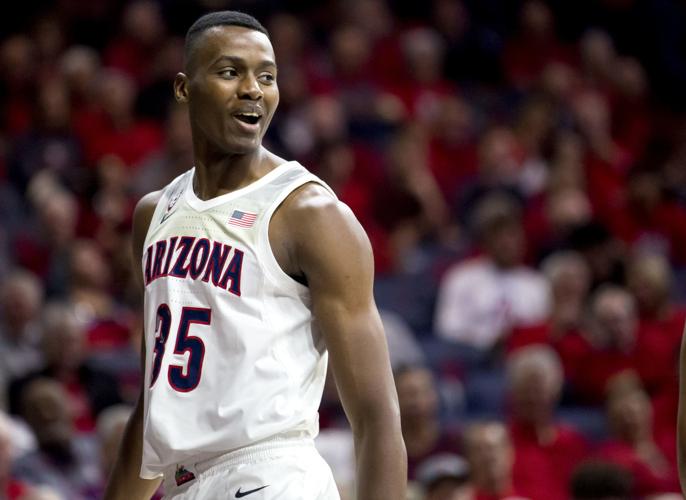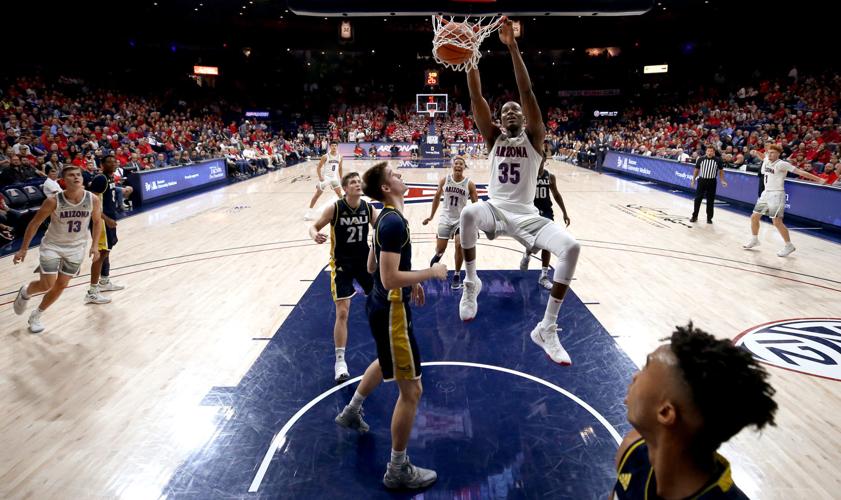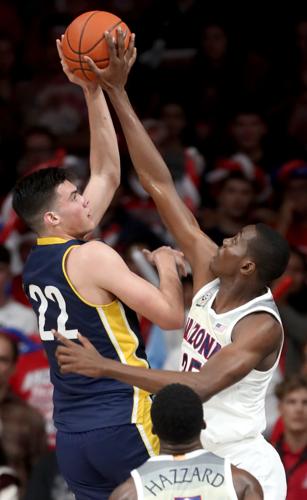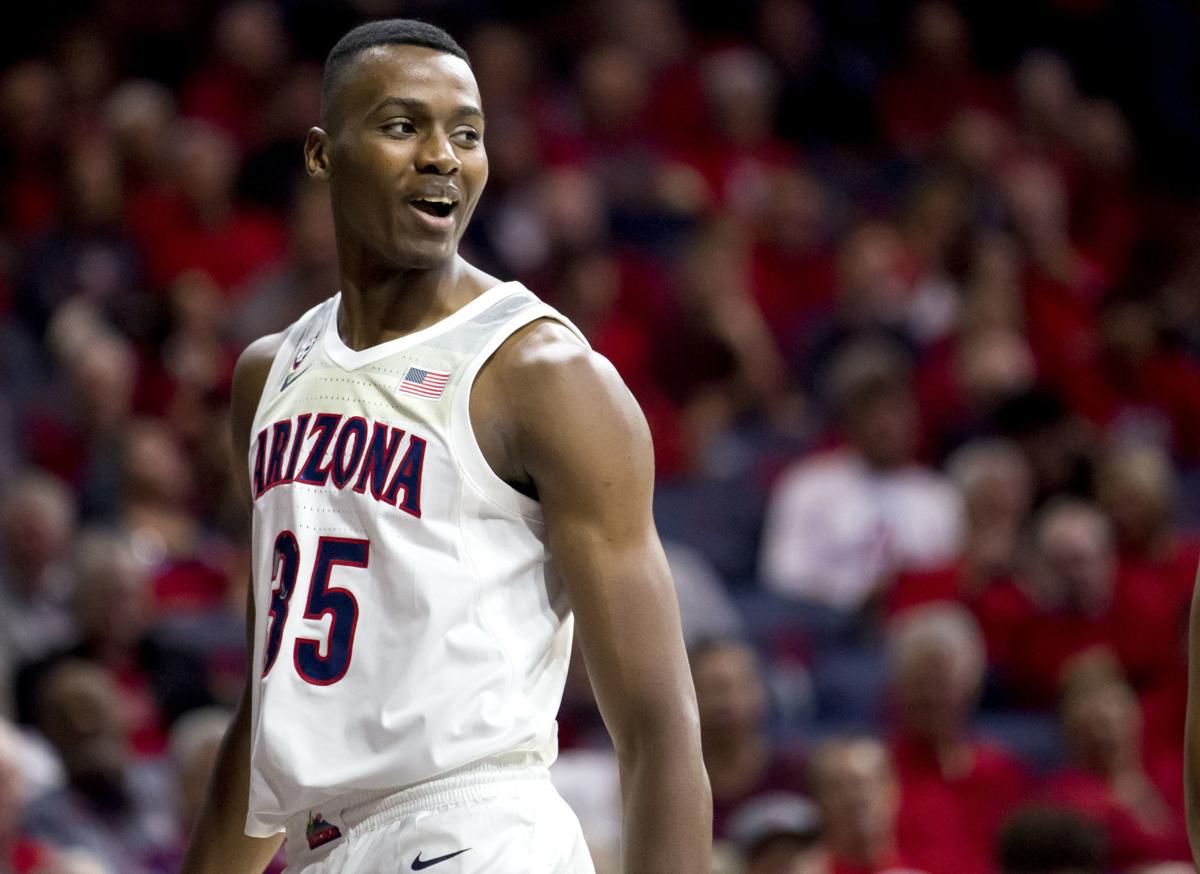For the next step of his young Arizona basketball career, slender 7-footer Christian Koloko may be asked Thursday to guard one of two imposing Oregon centers in front of the most intimidating crowd the Wildcats have faced this season.
For him, that’s nothing.
Imagine being a French-speaking high school junior from Africa, shipped halfway across the world to Los Angeles at the height of your teenage transition years because you have basketball potential, then trying to fit quickly into a new team, new culture and new language.
At first, Koloko didn’t.
“I knew the basics, but I couldn’t have a conversation with someone,” Koloko said last fall of his first month at Birmingham High School in the San Fernando Valley. “I couldn’t speak at school. I was always on the side, by myself, on my phone.”
Koloko wasn’t completely alone. He initially lived with his sister, Stephanie, and gradually became friends with teammates that included Devonaire Doutrive, whom he would later join briefly with the Wildcats this season before Doutrive was dismissed.
Thanks to their help, but mostly his own ability to adapt, things came along. Even though Koloko said he didn’t feel comfortable speaking English for a year, he somehow managed to pull off a 3.8 GPA as a junior while attracting attention from high-major colleges.
His gamble, his family’s gamble, had already begun to pay off.
The youngest of five children, including Stephanie and another sister now living in Paris, Christian was never expected to leave in the first place. But he was growing far taller than either of his parents, a 6-foot father and a 5-8 mother (the secret recipe is with his tall grandparents), and the lanky boy dripped with athleticism.
Koloko first picked up basketball at age 12, soon became one of Cameroon’s best prospects and was invited to the prestigious Basketball Without Borders camp in South Africa at age 17.
“That’s when I realized actually basketball can be something I was pretty good at,” Koloko said.
Soon after the camp, Koloko was persuaded to move to the United States, and his family arranged, somewhat reluctantly, to have him move in with Stephanie, who had begun working in Los Angeles after receiving an MBA from Long Beach State.

Arizona center Christian Koloko, dunking against NAU, has “found a contributing role” in his first year with the Wildcats, coach Sean Miller says.
Before long, he started adding offers from colleges, too. By the end of his junior season at Birmingham, Koloko was drawing interest from USC, UCLA, Cal, Harvard and Vanderbilt. The Wildcats, who had seen him play with Doutrive during the end of the 2017-18 season, jumped in, too.
They landed a commitment from Koloko shortly after he transferred to basketball powerhouse Sierra Canyon as a senior in the fall of 2018.
He was supposed to be a developmental player, mostly sitting behind a frontcourt loaded with veterans Chase Jeter, Ira Lee and Stone Gettings plus potential NBA pick Zeke Nnaji.
Koloko said he initially disliked the term “project,” but over the first month of the season, that’s exactly what he appeared to be.
In November, Koloko played in blowout wins over NAU, San Jose State, New Mexico State and Long Beach State but not at all in closer games against Illinois, South Dakota State, Pepperdine and Penn.
“It was definitely challenging because as a basketball player you always want to play and it was kind of tough for me just to be sitting on the bench every day,” Koloko said. “But the coaches just told me to be ready every time, that you never know, and when I get my chance, just play and do the best you can to help the team.”
That chance came when Gettings suffered a facial fracture and concussion against Penn on Nov. 28 in the Wooden Legacy. Two days later, Koloko received just over a minute of time against Wake Forest and then, six days later, played 12 when Nnaji fouled out at Baylor.
“Once Stone got injured, I just took the opportunity to show that I can play,” Koloko said. “Just block shots, rebound the ball and kind of help my team.”
After grabbing 10 rebounds in 13 minutes of UA’s Dec. 11 blowout of Nebraska-Omaha, the argument for playing Koloko grew stronger. He dipped into the Dec. 14 Gonzaga game for a minute, then played six against St. John’s on Dec. 21 when Jeter fouled out after 23 minutes

Arizona center Christian Koloko, dunking against NAU, has “found a contributing role” in his first year with the Wildcats, coach Sean Miller says.
“To his credit, he’s found a contributing role, and he’s helped us in numerous situations,” UA coach Sean Miller said. “I thought he really rallied our team (against St. John’s) and maybe allowed us to have a chance to win when we weren’t playing very well.”
So even when Gettings returned last Saturday against Arizona State, Koloko was still a fixture off the bench. He played 11 minutes, collecting eight points, six rebounds and two blocks while dunking twice to loud cheers.
But that game was a blowout against a smaller frontcourt.
Oregon could be a whole different deal.
Just last month, the Ducks added 250-pound five-star freshman center N’Faly Dante to play behind 235-pound sophomore Francis Okoro in the low post.
They’re the kind of guys who might prompt Miller to go with the rugged Lee more often off the bench, the kind of guys who might test exactly where Koloko is at this point.

Arizona center Christian Koloko (35) throughly rejects a jumper from Northern Arizona forward Brooks DeBisschop (22) in the second half of their early season game at McKale Center, Tucson, Ariz., Nov. 6, 2019.
Besides, in 10-plus years at UA, Miller never has regularly gone with a rotation of more than eight or nine players. But Miller says Koloko has proven himself capable of playing Thursday, or any other day, and that it will be important to match Oregon’s depth.
“Our strategy with Christian is to play him every game,” Miller said. “In some games, I think he’ll have a bigger window than others, but we want to make him a part of every game so he gets comfortable.”
Koloko says he feels like he’s helping defensively but is aiming to improve offensively and get stronger. He says he’s up to 220 pounds, and wants to be 225 at the end of the season, then maybe 235 entering next season.
So, go ahead, throw him in the fire. At this point, Koloko expects nothing less.
On and off the court.
“I’m kind of used to going to different places, and I adjust really fast,” Koloko said. “I think that’s really helped me.”







